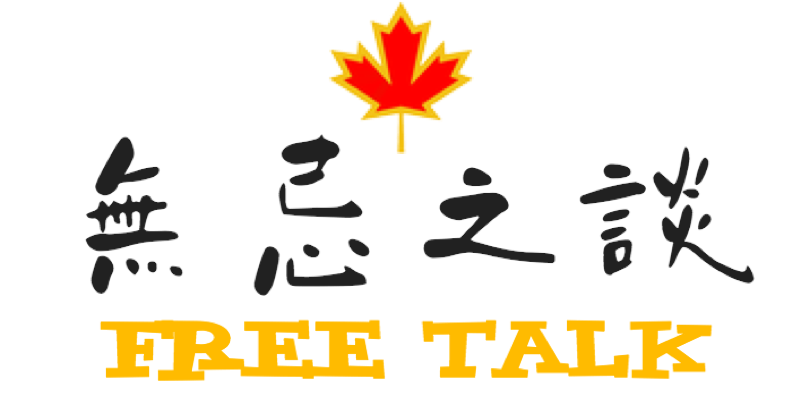Longjing tea (龙井), literally meaning Dragon Well tea, is a variety of pan-roasted green tea that named after its production region-Longjing Village of West Lake in Hangzhou, Zhejiang Province of China. Longjing tea has a history over 1200 years and is one of the most famous teas in China. It is well-known for its verdant color, beautiful elegant shape, strong fragrance and sweet mellow taste, hence, to be considered as “the Queen of Green tea”.
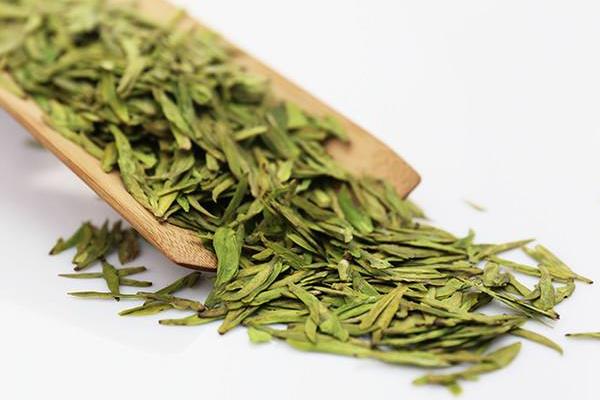
Legend
Longjing tea has a long history, but what makes it more famous is an emperor. According to the legend, the Qianlong Emperor (乾隆, 1711-1799 AD)in Qing dynasty often came to the regions south of the Yangtze River and visited Hangzhou. He went to the Hu Gong Temple under the Lion Peak Mountain (Shi Feng Shan狮峰山) and was presented with a cup of Longjing tea, which was picked from the 18 tea bushes in front of the Hu Gong Temple. The Qianlong Emperor was so impressed by the Longjing tea that he conferred these 18 tea bushes as “Royal Tea Trees”.
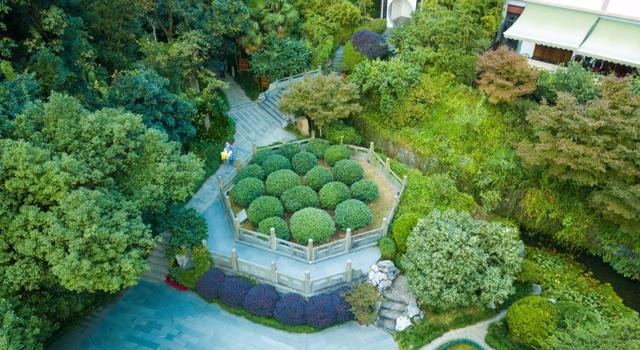
There is another legend connecting the Qianlong Emperor to Longjing tea. Once when Qianlong came to Longjing Shifeng and learned the tea-picking, his follower told him that his queen mother was ill. After he returned to Beijing, his mother smelt the fragrance of the Longjing Tea that were put in his sleeves from Hangzhou and felt better after drinking the water with the tea. Therefore, Qianlong was so happy that he praised Longjing Tea as tribute and ordered people to pick every year to present for his queen mother. Afterwards, Longjing Tea became more famous as the head of all tea types in China.
Longjing tea is also conntected with Longjing Spring, from where the village, tea and temple got the same name—Longjing. According to legend, Longjing Spring is connected to the sea, where there is endless water. Since there are dragons in the sea, this spring is called “Longjing” (dragon well). The current Longjing Spring is a large circular spring pool. The spectacular thing is, when the spring water is stirred, a dividing line will appear on the surface, swinging gently like a thin dragon whisker and then disappearing slowly.
Picking
The five main plantation regions are Lion Peak Mountain (Shi Feng,狮), Dragon Well Village (Longjing Cun,龙), Five Cloud Mountain (Wuyun,云), Tiger Running Temple (Hupao,虎) and Meijiawu (梅). The superior geographical environment and good quality water resources around West Lake have contributed much to the growth of Longjing tea. Both the picking and making processes of Longjing tea are elaborate in order to ensure the high quality and original flavor.
There are three characteristics of Longjing tea picking: early, tender and diligent. Tea farmers often say, “Tea is an epoch grass, picking three days early is a treasure, while picking three days late turns into grass.” Much importance is emphasized on the seasonality of the leaves being picked. The tea leaves that are picked before Qingming (Tomb-Sweeping Day, April 4/5) are the best, known as Ming Qian or Pre-Qingming Longjing tea; and teas collected between Qingming and Guyu (Grain Rain, April 20/21) are also of good quality, known as Yu Qian or Pre-Guyu Longjing tea; while the leaves picked after Guyu are ordinary.
Longjing tea is also known for its delicate picking. The tenderness of fresh leaves forms the basis of the quality of Longjing tea. Due to the different parts of tea tree, the chance of obtaining nutrients is also different, thus the picking is in the order of top buds first, axillary buds next, and latent buds last. Longjing tea area promotes multiple early harvesting and tender harvesting in batches, which can continuously promote the growth of axillary buds and the germination of latent buds, increase the number of buds and yield. West Lake Longjing tea generally collects 14-16 batches of spring tea, 6-8 batches of summer tea, and 20 batches of autumn tea. A total of 40-44 batches are collected throughout the year. The annual picking period is 190-200 days.
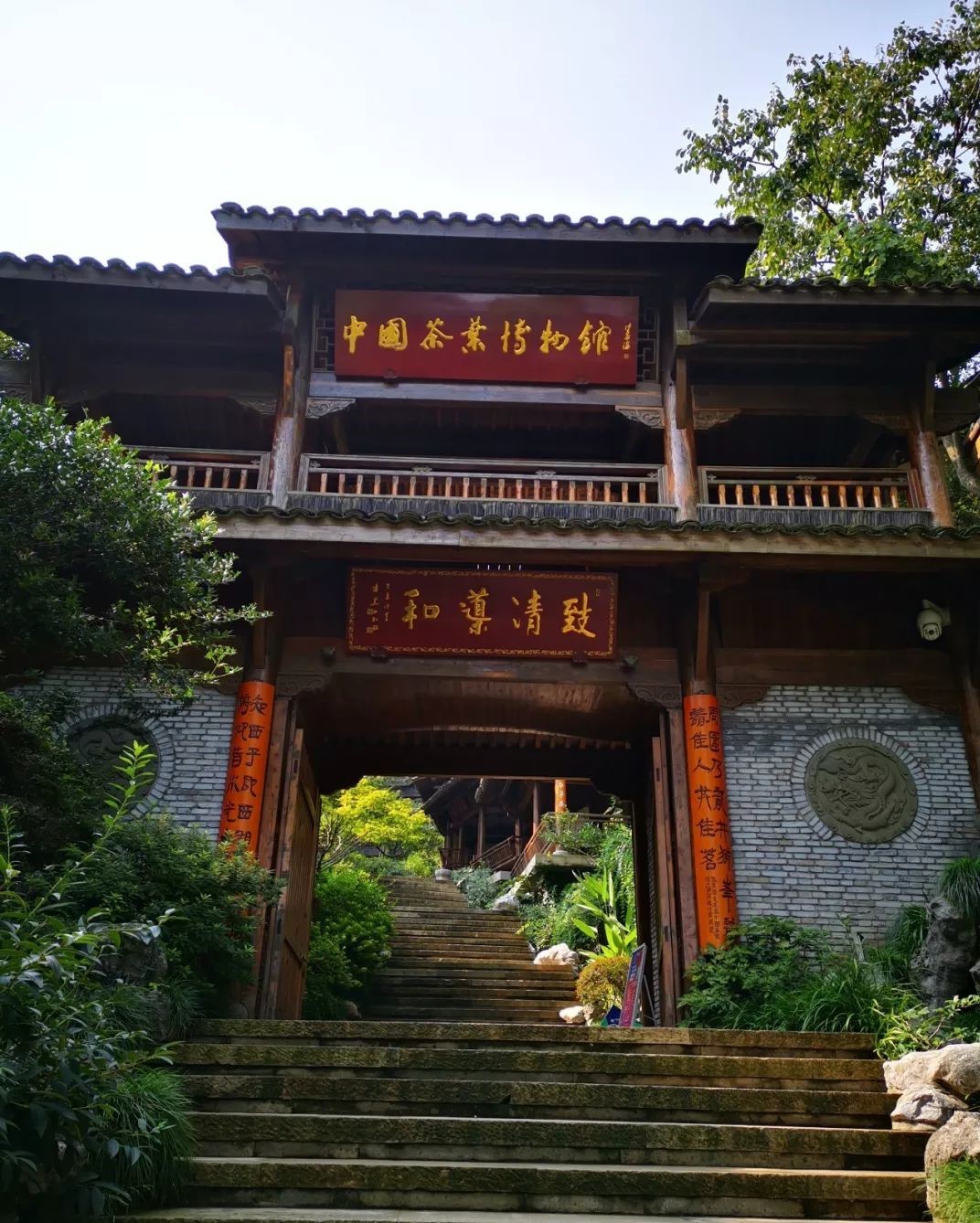
Production
The process of making Longjing tea is very strict. It usually employs iron pans for baking the tea, and it involves ten techniques based on different temperatures and moisture, including: tossing, shaking, picking, fanning, expanding, throwing, grasping, pushing, buckling and grinding. Different quality tea leaves have different frying methods. A skillful tea-making master knows exactly how and when to use a certain technique according to the changes of moisture and temperature. The main processes are as following:
- Pick fresh tea leaves: Longjing tea leaves are picked during different periods of time. Generally speaking, the best is picked before Qingming Festival around the beginning of April, which is called Mingqian Tea. The one picked before Grain Rain around the middle of April are also fairly good and are called as Yuqian Tea.
- Spread and cool: Spread the leaves with a thickness of about 2cm (0.8 in) for about 2 hours to give off the heat during transport.
- Fry: Put the cooled leaves in a wok in gentle temperature and fry it with hands. This to send out water of the leaves.
- Spread and cool: Spread the fried leaves and wait for 40-60 min. Get out the broken pieces.
- Dry: There are many methods. Usually, the leaves are fried again with low fire. After, put charcoal in a bag and put the bag in the container with Longjing. The charcoal should be changed every 2 months. Lime powder can do the same thing, but it should be replaced every month.
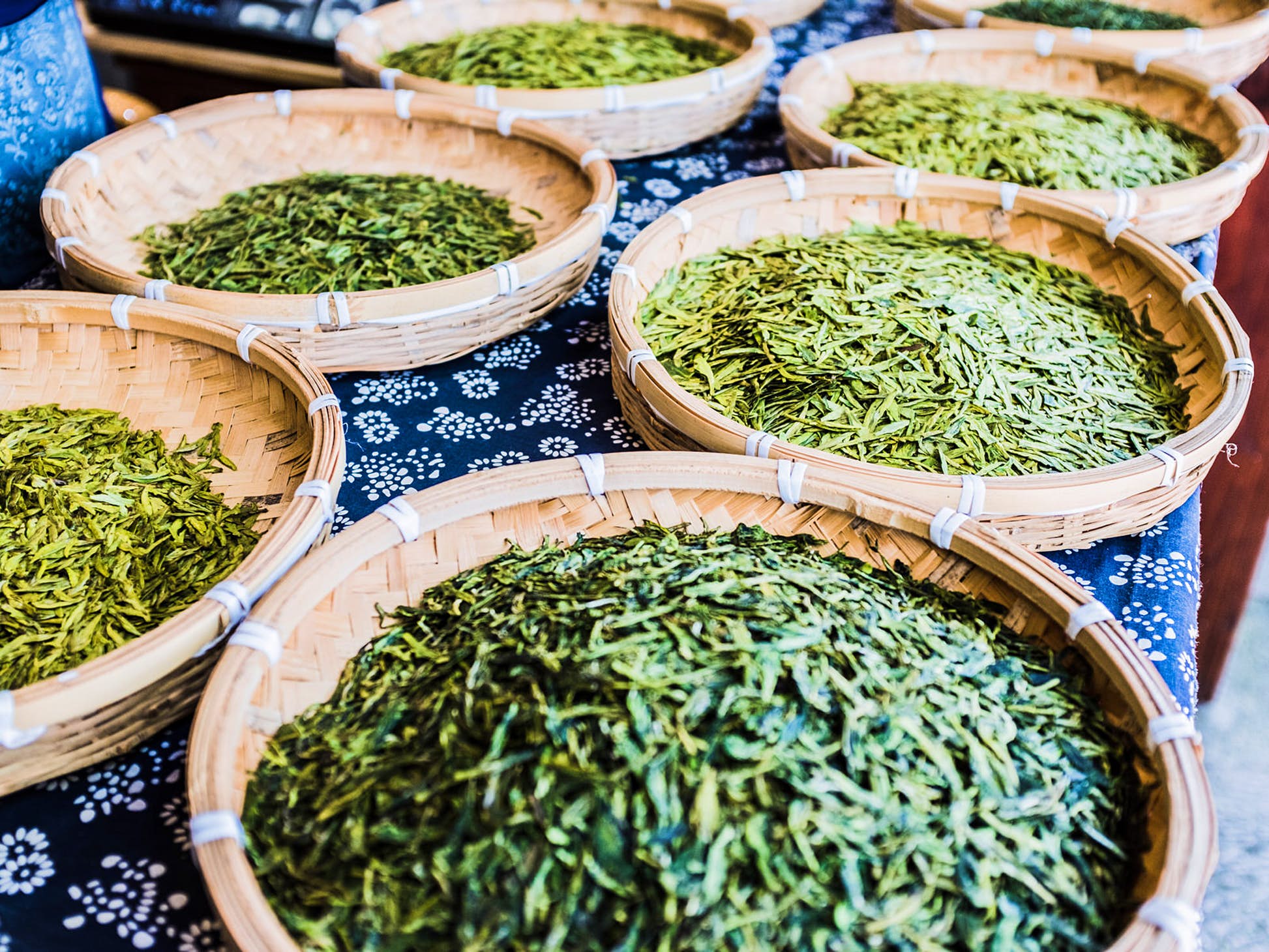
Benefit
- Diuretic. Theophylline in Longjing tea has diuretic effect and can be used to treat edema disease.
- Allaying tiredness. Caffeine in Longjing tea can excite the central nervous system and help people to lift up their spirits, enhance their thinking, eliminate fatigue and improve their work efficiency.
- Antibacterial. Tea polyphenols and tannins in Longjing tea act on bacteria, coagulate bacterial proteins and kill them. If the mouth is inflamed, festering and the throat is sore, you can drink Longjing tea to treat it.
- Anti-aging. Tea polyphenols in Longjing tea can effectively remove the excess free radicals and prevent the peroxidation of fatty acids.
- Treating halitosis (bad breath). The food residue in the mouth produces methyl mercaptan compound under the action of enzyme to produce odor. Longjing tea can inhibit the activity of this enzyme and play a role in eliminating halitosis.
- Caries prevention. Longjing tea contains fluorine, which has a great affinity with the calcium of teeth. It can become a kind of “fluorapatite” that is difficult to dissolve in acid, just like adding a protective layer to teeth, which improves the ability of anti-acid and anti-caries of teeth.
- Inhibiting atherosclerosis. Tea polyphenols and vitamin C in Longjing tea have the function of promoting blood circulation and removing blood stasis to prevent arteriosclerosis.
- Treating night blindness and dry eye. There is a certain amount of vitamin A in Longjing tea, and the eye-protecting effect of Longjing tea is closely related to vitamin A.
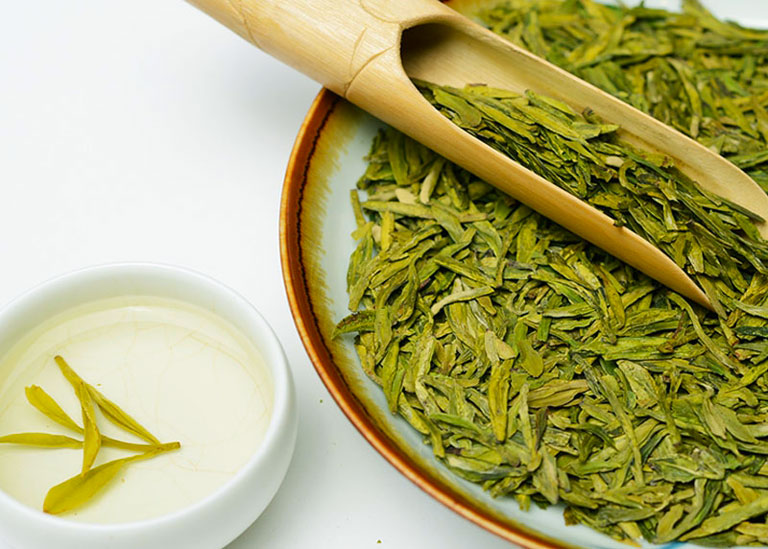
Brewing
Preparation: Get some Longjing tea, a glass cup, and a bottle of mineral spring water ready, and then put three grams (one teaspoon) of tea into the cup.
Warm tea cup: Pour some boiled water into the tea cup to warm it up. After, pour out the water.
Clean the tea leaves: Pour a little (about 50ml) heated spring water (80°C to 90°C) into the cup. Gently swirl the cup, and then pour out the water, keeping the tea leaves in the cup. This should clean off any dust etc. on the tea from the manufacturing process.
Brew the tea: Pour some tea leaves into the tea cup and then pour in 1/3 cup of water. Shake it well and pour in another 1/3 cup of water. Leave it for 3-5 minutes, a cup of Longjing tea is ready to be enjoyed. The leaves: water ratio should be about 1:50, which means 150 ml of water for 3 g of tea.
Drink the Tea: Drink the tea in the following three minutes, and you can enjoy a perfect cup of Longjing tea.
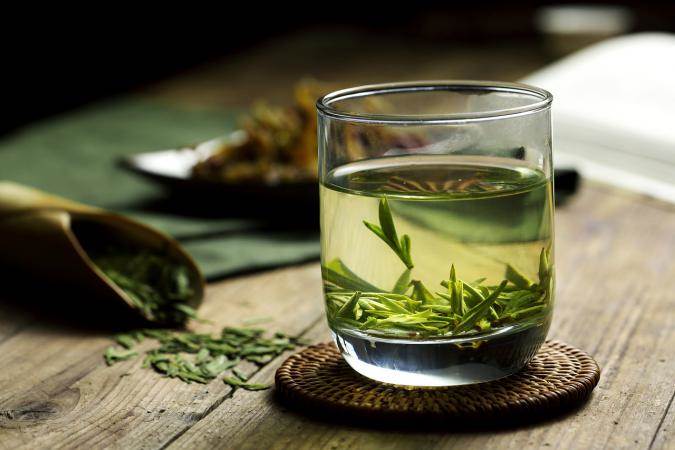
Precaution of drinking Longjing tea
- Pregnant women should not drink Longjing tea.
- Women should not drink Longjing tea during lactation. Caffeine will enter the milk, and children will be excited indirectly after sucking milk, which is easy to cause less sleep and more crying.
- People with a fever should not drink Longjing tea. Caffeine in tea can not only raise the body temperature, but also reduce the efficacy of drugs.
- Patients with liver diseases should not drink Longjing tea. Most of the caffeine and other substances in tea are metabolized by the liver. If people have liver disease, drinking too much tea may damage the liver tissue.
